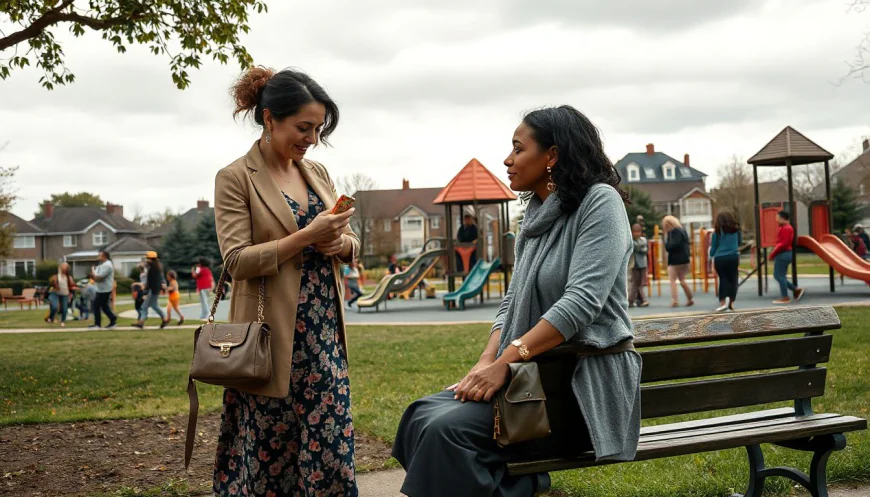Parenting & Class Divide: Viral Backlash to a Parenting Video Highlighting Economic Inequality
Society plays out in every corner of social media. Today, platforms like TikTok, Instagram, and YouTube are full of parenting stories and advice. But some videos go beyond good tips—they spark big debates, especially around deep issues like money and class differences. Recently, a parenting video that revealed stark economic disparities went viral and sparked loud criticism and support. This online backlash isn't just a fuss—it shows us important truths about how we see wealth, parenting, and fairness today.

The Power of Parenting Content on Social Media
The Rise of Parenting Influencers
Parenting influencers are shaping what many people believe is the right way to raise kids. These influencers share daily routines, tips, and even family struggles. They reach millions, creating a strong voice that impacts how society views parenting. In fact, research shows that over 70% of parents say they learn from these influencers.
Viral Videos as Catalysts for Social Debate
Some videos go viral because they hit a nerve or make us feel something strong. Think of a video showing a wealthy family’s lifestyle compared to a less privileged one. When shared widely, these clips do more than entertain—they spark conversations about inequality. The secret to their power is emotional impact and easy shareability.
Ethical Responsibilities of Content Creators
People creating content carry a lot of influence. They can inspire, but they also shape societal values. A viral video that talks about inequality should be responsible. Authenticity matters, but creators have to consider social impact—what message are they sending? Do they promote fairness or stir division?
The Viral Backlash: A Detailed Breakdown
The Content of the Controversial Video
The video showed two families: one wealthy and one struggling. It highlighted differences in how they spend money, offer their children opportunities, and manage daily routines. The visual contrast was sharp. It aimed to show how economic status affects parenting choices and access to resources.
Public and Online Reactions
Supporters praised the video for showing truth others ignore. Critics argued it was insensitive and biased. Many comments called out privilege and accused the creator of promoting stereotypes. Some felt the video simplified complex social issues or painted lower-income families unfairly.
Why the Video Sparked Outrage
People’s reactions depend on where they stand. Wealthy viewers might see it as a wake-up call. Lower-income viewers may feel misunderstood or judged. Cultural backgrounds influence how we interpret wealth disparities. Some saw the video as an attack, others as eye-opening.
Underlying Issues of Socioeconomic Inequality in Parenting
Economic Class and Parenting Styles
Class impacts parenting in many ways. Families with higher incomes often access better education, healthcare, and extracurriculars. Lower-income families face more hurdles and fewer options. Studies show children from wealthier families tend to do better in health and learning, partly because of these resources.
Representation and Bias in Media
Media often reinforces stereotypes. Wealthy families are shown as ideal, while poor families face blame. When media highlights disparities or biases, it shapes opinions and policies. Misrepresentation can deepen divides or overlook struggles many face.
The Role of Cultural Expectations
Society sets standards for what good parenting looks like. Many believe raising perfect children involves expensive activities or certain lifestyles. Lower-income families find it hard to meet these standards, which can create feelings of shame or failure. These pressures widen the gap between what’s ideal and what’s realistic for many families.
The Impact of Social Backlash on Public Discourse
Amplification of Class Divides
When viral videos cause anger, they often divide opinions even more. It can lead to us seeing neighbors or other families as enemies instead of fellow humans. Past conflicts, like heated debates about welfare or school choices, show how social media can widen these gaps instead of bridging them.
Opportunities for Constructive Dialogue
Backlash isn’t all bad. If managed wisely, it can turn into real conversations about inequality and social justice. Respectful debates help us see different sides and find common ground. Asking questions like "How can we help all families?" guides healthy discussions.
The Role of Policy and Community Action
These online debates can lead to real change. When enough voices demand action, policymakers listen. Communities can also do more—adding support programs, affordable childcare, or equal access to education. Social media is a tool that can push for better policies if used responsibly.
Actionable Tips for Content Creators and Audience
For Parenting Influencers
Think about how your content impacts others. Use empathy, and avoid stereotypes. Share stories from many different kinds of families. Show how diverse parenting can be—rich, poor, or somewhere in between.
For Audience Members
Don’t take everything you see at face value. Question, analyze, and learn. Support efforts for more equity—whether in education, healthcare, or parenting resources. Foster kindness, even around tough issues.
For Policymakers and Community Leaders
Use these conversations as a push to change. Invest in programs that reduce income gaps. Promote media literacy so more people understand complex social issues. Education and community projects are powerful tools for equity.
Conclusion
Addressing class divides in parenting isn’t just a social issue—it’s a moral one. Viral videos can teach us hard truths or deepen divides, depending on how we respond. The role of social media is big—it can build bridges or walls, depending on what we choose to do. We all have a part to play—content creators sharing responsibly, viewers thinking critically, and communities pushing for fairer policies. When we work together, we can help close the gap and create a society where every parent and child has a fair shot.



 VARSHITHA
VARSHITHA